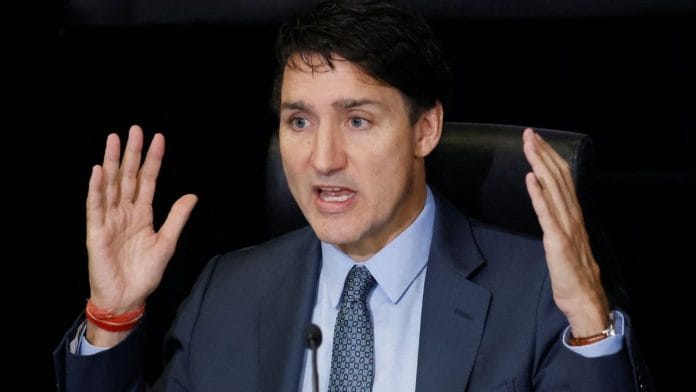Canada’s golden poster boy Justin Trudeau, who emerged triumphant in 2015, has resigned from prime ministership citing ‘internal battles’ in the governing party. However, this is not a story about Canadian politics alone. Trudeau’s fall from grace is symptomatic of what’s going on in the West’s lazy knee-jerk liberal politics of blind appeasement and mindless celebration of migration. Across the world, this brand of politics is taking a hit. What replaces it is a story that is still unfolding. But this much is certain – the old ways of doing things are no longer tenable.
The decline of Trudeau and his brand of politics is evident from his approval ratings, which nosedived from 65 per cent in September 2016 to 22 per cent in December 2024. During his decade-long tenure, Trudeau was often criticised for his ‘performative’ politics. Conservative leader Pierre Poilievre, for one, called Trudeau’s ideology extremely radical and similar to “authoritarian socialism.”
The discontent in Canada raises a crucial question: Was Justin Trudeau’s failure a result of his policies, or the natural cycle of anti-incumbency?
Flawed policies
It would be simplistic to say his policies and values alone played a role in his resignation; several factors, including a shift in voter demographics and global challenges, brought his downfall.
Let’s start with his immigration policies, which were a prominent feature of Trudeau’s leadership. They drew criticism and praise in equal measure. His ambitious plan to boost Canada’s immigrant intake by admitting 500,000 people by 2025 was supposed to be a strategic response to the country’s chronic labour shortages. However, when juxtaposed with Canada’s housing crisis, it exposes the delicate balance between aspiration and practicality in governance. When Trudeau took office in 2015, the average house cost in Canada was $446,000. That figure soared to $732,000 in 2024, after peaking at $834,000 in March 2022.
Covid-19 brought with it increased criticism for the outgoing PM. His lockdown measures were lambasted for adversely affecting small businesses and leading to job losses. Additionally, he faced opposition for environmental policies such as the federal carbon tax. Furthermore, Trudeau’s attempts at boosting oil production while introducing measures to reduce emissions fuelled widespread discontent. According to a 2024 article by The Wall Street Journal, the tussle between climate change and the oil-and-gas industry was most evident in provinces such as Alberta, where the oil industry employs over 140,000 people and is responsible for one-fifth of the government’s revenue. But economic concerns alone do not explain the decline in Trudeau’s popularity.
Also read: Indians will never forgive Trudeau. Or forget
No country for token politics
Politics built on superficial gestures of inclusivity is losing its appeal in a world that demands tangible results and authentic leadership. A Ukrainian Nazi was accidentally applauded in Canadian Parliament and praised as a “Ukrainian and Canadian hero”. Trudeau later apologised for the grave error, but such mistakes only reduce trust. His liberal credentials also came under scrutiny when he evoked never-before-used emergency powers to suppress truckers’ protests in 2022. And then there was the famous blackface controversy, when photos of him dressing up in blackface in the 1990s surfaced on the internet. Trudeau again apologised profusely, stating that “layers and layers of privilege” had stopped him from seeing the act as racist back then.
On top of all these, the cost of deteriorating diplomatic relations with India over the contentious Khalistan issue must have become too much for his party and government to ignore. Ultimately, politics of symbolic gestures, token representation, and selectivity can only win short-term applause. It often alienates broader constituencies and risks reducing complex communities to political props.
There could, therefore, be several reasons for Trudeau’s resignation. It could have been prompted by ambitious immigration policies, or the failure to deliver at home while making big global humanitarian commitments. It could also be driven by palpable voter fatigue, or the inevitable desire for a change in leadership. Or a mix of everything.
His resignation depicts a clear shift in Canadian politics. Trudeau is leaving behind a legacy that will be debated for years to come. The challenge for his successor will be to address the frustrations that led to his decline while taking the country toward a better future.
Amana Begam Ansari is a columnist. She runs a weekly YouTube show called ‘India This Week by Amana and Khalid’. She tweets @Amana_Ansari. Views are personal.
(Edited by Zoya Bhatti)






